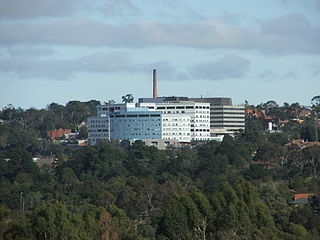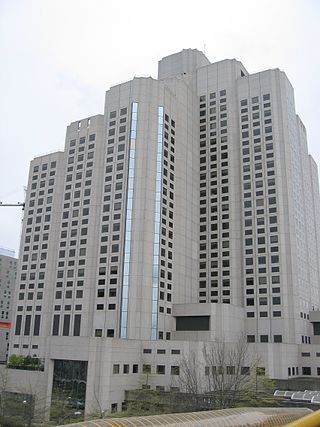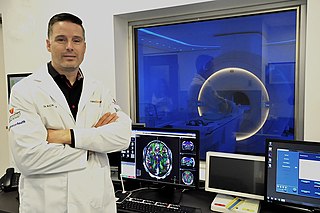
Michael Smith was a British-born Canadian biochemist and businessman. He shared the 1993 Nobel Prize in Chemistry with Kary Mullis for his work in developing site-directed mutagenesis. Following a PhD in 1956 from the University of Manchester, he undertook postdoctoral research with Har Gobind Khorana at the British Columbia Research Council in Vancouver, British Columbia, Canada. Subsequently, Smith worked at the Fisheries Research Board of Canada Laboratory in Vancouver before being appointed a professor of biochemistry in the UBC Faculty of Medicine in 1966. Smith's career included roles as the founding director of the UBC Biotechnology Laboratory and the founding scientific leader of the Protein Engineering Network of Centres of Excellence (PENCE). In 1996 he was named Peter Wall Distinguished Professor of Biotechnology. Subsequently, he became the founding director of the Genome Sequencing Centre at the BC Cancer Research Centre.

The University of Northern British Columbia (UNBC) is a university serving the northern region of the Canadian province of British Columbia. It is not affiliated with UBC. The main campus is located in Prince George, with additional campuses located in Prince Rupert, Terrace, Quesnel, and Fort St. John. Because of its northern latitude, UNBC is a member of the University of the Arctic. In the 2020–21 academic year, 4,253 students were enrolled at UNBC.

Marco A. Marra is a Distinguished Scientist and Director of Canada's Michael Smith Genome Sciences Centre at the BC Cancer Research Centre and Professor of Medical Genetics at the University of British Columbia (UBC). He also serves as UBC Canada Research Chair in Genome Science for the Canadian Institutes of Health Research and is an inductee in the Canadian Medical Hall of Fame. Marra has been instrumental in bringing genome science to Canada by demonstrating the pivotal role that genomics can play in human health and disease research.

The University of Texas MD Anderson Cancer Center is a comprehensive cancer center in Houston, Texas. It is the largest cancer center in the U.S. and one of the original three comprehensive cancer centers in the country. It is both a degree-granting academic institution and a cancer treatment and research center located at the Texas Medical Center in Houston, the largest medical center and life sciences destination in the world. It is affiliated with The University of Texas Health Science Center at Houston. MD Anderson Cancer Center has consistently ranked #1 among the best hospitals for cancer care and research in the U.S. and worldwide, and it has held the #1 position 19 times in the last 22 years on U.S. News & World Report's Best Hospitals rankings for cancer care. As of 2023, MD Anderson Cancer Center is home to the highest number of cancer clinical trials in the world and has received more NCI-funded projects than any other U.S. institute. In 2024, Newsweek placed MD Anderson at #1 in their annual list of the World's Best Specialized Hospitals in oncology.

The Austin Hospital is a public teaching hospital in Melbourne's north-eastern suburb of Heidelberg, and is administered by Austin Health, along with the Heidelberg Repatriation Hospital and the Royal Talbot Rehabilitation Centre.

Sunnybrook Health Sciences Centre (SHSC), commonly known as Sunnybrook Hospital or simply Sunnybrook, is an academic health science centre located in Toronto, Ontario, Canada. It is the largest trauma centre in Canada and the only accredited Level 1 trauma centre outside of the US. Sunnybrook is a teaching hospital fully affiliated with the University of Toronto. The hospital is home to Canada's largest veterans centre, in the Kilgour Wing and the George Hees, which cares for World War II and Korean War veterans.
A hierarchy of evidence, comprising levels of evidence (LOEs), that is, evidence levels (ELs), is a heuristic used to rank the relative strength of results obtained from experimental research, especially medical research. There is broad agreement on the relative strength of large-scale, epidemiological studies. More than 80 different hierarchies have been proposed for assessing medical evidence. The design of the study and the endpoints measured affect the strength of the evidence. In clinical research, the best evidence for treatment efficacy is mainly from meta-analyses of randomized controlled trials (RCTs). Systematic reviews of completed, high-quality randomized controlled trials – such as those published by the Cochrane Collaboration – rank the same as systematic review of completed high-quality observational studies in regard to the study of side effects. Evidence hierarchies are often applied in evidence-based practices and are integral to evidence-based medicine (EBM).

Vancouver General Hospital is a medical facility located in Vancouver, British Columbia. It is the largest facility in the Vancouver Hospital and Health Sciences Centre (VHHSC) group of medical facilities. VGH is Canada's third largest hospital by bed count, after Hamilton General Hospital, and Foothills Medical Centre.
The Kolling Institute is located in the grounds of the Royal North Shore Hospital in St Leonards, Sydney Australia. The institute, founded in 1920, is the oldest medical research institute in New South Wales.

The Cambridge Biomedical Campus is the largest centre of medical research and health science in Europe. The site is located at the southern end of Hills Road in Cambridge, England.

The Libin Cardiovascular Institute is an entity of Alberta Health Services and the University of Calgary. It connects all cardiovascular research, education and patient care in Southern Alberta, serving a population of about two million. Its more than 1,500 members include physicians, clinicians and other health professionals, researchers and trainees.
Allen Charles Edward Eaves is the co-founding Director of the Terry Fox Laboratory for Hematology/Oncology Research, which over a 25-year period (1981–2006) he grew into an internationally recognized centre for the study of leukemia and stem cell research. His own research on chronic myelogenous leukemia (CML) has led the way to a new understanding of the disease. As Head of Hematology at the British Columbia Cancer Agency and the University of British Columbia for 18 years (1985–2003) he engineered the building of one of the first and largest bone marrow transplant programs in Canada. In recognition of his research accomplishments and leadership in moving basic science discoveries in stem cell biology into the clinic, he was elected President of the International Society of Cellular Therapy (1995–1997), Treasurer of the Foundation for the Accreditation of Cellular Therapy (1995–2002) and President of the American Society of Blood and Marrow Transplantation (1999–2000). In 2003 he was awarded the prestigious R. M. Taylor Medal by the Canadian Cancer Society and the National Cancer Institute of Canada.

Michael R. Hayden, is a Killam Professor of Medical Genetics at the University of British Columbia, the highest honour UBC can confer on any faculty member. Only four such awards have ever been conferred in the Faculty of Medicine. Dr. Hayden is also Canada Research Chair in Human Genetics and Molecular Medicine. Hayden is best known for his research in Huntington disease (HD).

The Michael G. DeGroote School of Medicine, known as the McMaster University School of Medicine prior to 2004, is the medical school of McMaster University in Hamilton, Ontario, Canada. It is operated by the McMaster Faculty of Health Sciences. It is one of two medical programs in Canada, along with the University of Calgary, that operates on an accelerated 3-year MD program, instead of the traditional 4-year MD program.
Aubrey Tingle is professor emeritus in the Department of Pediatrics at the University of British Columbia (UBC) and chair of the board of directors at the Maternal, Infant, Child and Youth Research Network. In March 2001, Tingle was appointed the first president and CEO of The Michael Smith Foundation for Health Research (MSFHR).

The Edinburgh Cancer Research Centre (ECRC), also known as the University of Edinburgh Cancer Research Centre, is a center for basic, translational and clinical cancer research located in Edinburgh, Scotland. ECRC constitutes a part of the Institute of Genetics & Molecular Medicine (IGMM) and is positioned in direct proximity of the Western General Hospital, where most of its clinical activities take place.

Abbotsford Regional Hospital and Cancer Centre (ARHCC) is a 300-bed Canadian health care facility in the City of Abbotsford, British Columbia that houses the acute care Abbotsford Regional Hospital (ARH) operated by Fraser Health and the regional cancer facility operated by the BC Cancer Agency.
Colleen Nelson is a scientist in prostate cancer research. She founded and directs the Australian Prostate Cancer Research Centre – Queensland (APCRC-Q). The Centre, based at the Translational Research Institute and the Princess Alexandra Hospital, spans the spectrum of discovery of new therapeutic targets and their preclinical and clinical development. She is also Chair of Prostate Cancer Research at Queensland University of Technology (QUT).

Ryan C.N. D'Arcy is a Canadian neuroscientist, researcher, innovator and entrepreneur. D'Arcy co-founded HealthTech Connex Inc. where he serves as President and Chief Scientific Officer. HealthTech Connex translates neuroscience advancements into health technology breakthroughs. D'Arcy is most known for coining the term "brain vital signs" and for leading the research and development of the brain vital signs framework.
Robert Holt, is a genomic scientist and immunogeneticist. He is currently a Distinguished Scientific at the BC Cancer Research Centre, where he is also Co-Director of the BC Cancer Immunotherapy program. He is also appointed as Professor of Medical Genetics at the University of British Columbia and Professor of Molecular Biology & Biochemistry at Simon Fraser University. Through international consortia, he has had made several significant contributions to science. After initial sequencing of the Drosophila and human genomes was co-PI on the NIH program to sequence the rat genome, and was also a PI on the international effort to sequence the malaria mosquito genome, which involved >30 principal scientists from 11 different countries. With his publications exceeding over 200 and his citations being recorded approximately 70,000 times, Holt earned a position in the top 1% of Web of Science cited researchers by Clarivate Analytics in 2018 and 2019.
















